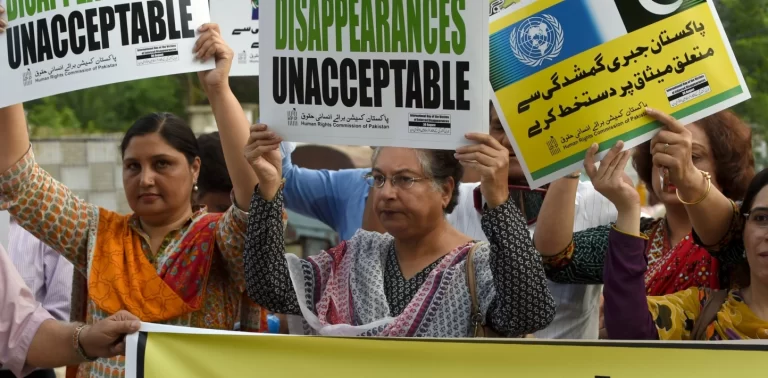
In its first assessment of the human rights situation in Pakistan under the incumbent Pakistan Democratic Movement (PDM) government, the US State Department notes that the human rights situation in the country remains a cause of concern.
Released on Monday, the annual State Department report refers to several events that occurred in 2022, including former prime minister Imran Khan’s Azadi March to protest his removal from office.
The report also refers to Pakistan Tehreek-e-Insaf (PTI) chairman’s claim that his march to Islamabad was impeded due to barriers imposed by the federal government, and that participants were subjected to tear gas and arrests. “Two participants reportedly died, and thousands were arrested by security forces.”
The document, however, also points out, “There were no reports of restrictions on political parties participating in elections, except for those prohibited due to terrorist affiliations” in 2022.
The report notes that during this period, judges ordered media regulatory agencies to enforce constitutional bans on content critical of the military or judiciary, “compelling media to censor politicians’ speeches and election-related coverage deemed anti-judiciary or antimilitary”.
Organisations that monitored press freedom “reported direct pressure on media outlets to avoid content on possible military influence over judicial proceedings against politicians and positive reporting of opposition leaders,” the report adds.
The State Department report, however, acknowledges that in the elections held in 2022, “in most areas there was no interference with the right of political parties and candidates to organise campaigns, run for election, or seek votes.”
In Balochistan, however, there were reports that “security agencies and separatist groups harassed local political organisations, such as the Balochistan National Party and the Baloch Students Organisation,” the report adds.
According to the State Department during 2022, its monitors received credible reports of unlawful or arbitrary killings, including extrajudicial killings by the government or its agents; forced disappearances by the government or its agents; torture and cases of cruel, inhuman, and degrading treatment or punishment by the government or its agents.
Conditions remained harsh and life-threatening in prisons across Pakistan where arbitrary detention of political and other prisoners also happened.
Pakistan also imposes serious restrictions on free expression and media, including violence against journalists, unjustified arrests and disappearances of journalists, censorship, and criminal defamation laws.
The report also refers to laws against blasphemy, serious restrictions on internet freedom and substantial interference with the freedom of peaceful assembly and freedom of association.
The report says that Pakistan also has serious government corruption; lack of investigation of and accountability for gender-based violence; and crimes involving violence or threats of violence targeting members of racial and ethnic minorities. Crimes involving violence or threats of violence targeting lesbian, gay, bisexual, transgender, queer, or intersex persons are also common, it adds.